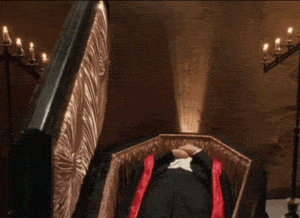The revenge has just begun. Through the ages, time is on my side.
The Count Dracula, with his enchanting and painfully idiosyncratic personality, is a nobleman, of an aristocratic and extremely powerful family, a servant of the macabre and the dark.
"Welcome to my house! Come in freely. Come with safety, and leave some of the happiness you bring."
His figure is tall, slender, hypnotic, satanically dark and capable of appalling and hair-raising deeds.
A chimerical nightmare, a bloodthirsty, bloodsucking, senseless criminal, the brother of the moonstruck moon and the tamer of wolves, insects and predators.
An overbearing, insolent and unsurpassable presence by human forces, he haunts the midnight from his abandoned and desolate Tower with the aim of extending his rule and remaining eternal... by drinking blood.
"...I heard as if from very low in the valley the howls of many wolves. The Count's eyes shone, and he said: 'Hear them, the children of the night. What music they make!' Seeing, I suppose, some expression on my face that seemed strange to him, he added, 'Ah, sir, you city dwellers cannot enter into the feeling of the hunter.'"
The sovereign of the notorious power of the Undead symbolizes the power of the dreamy identity, the transformation of the material into immaterial, as well as the absolute union of the fantastic terror with elements of reality.
His shadow covers the craggy mountains of Transylvania for ages and his footsteps are forever imprinted on the Romanian Alps.
This particular novel by the Irish writer Bram Stoker is not just a book of horror and fear, it is the epitome of the gothic literary genre.
Certainly, it is a classic, transcendent work, as immortal as the archetypal figure of Dracula that pervades it.
It is a mythical tale, a nightmarish journey with the destination being eternal spiritual condemnation and subjection to the undead creatures that delight in drinking blood and obey the sadistic instincts of the bloody leader of the earthly hell.
It was published in 1897 as an epistolary novel with diary entries of the characters who are the protagonists. Its creation took seven years. It is the result of research and study of European folk traditions and superstitions and the stories of vampires from all over the world.
Since then, it has taken the first place in the hearts of countless people as the most exciting prototype of dark horror and even sexual pleasure of vampiric prescriptions...
The Count Dracula has inspired playwrights, writers, filmmakers and directors and will continue to do so with incredible success.
The dead and rotten earth became the bed of the monster with the red eyes, the fangs and the enormous power. His satanic smile enchantingly intoxicates the victims who are left undoubtedly in their bloodletting for the pleasure of the monster that exercises an unnatural attraction of every kind. The only response of the victims is the Divine presence and help that can drive away or even exterminate the Evil.
Somehow, the Count Dracula thus acquired the meaning of the senseless and consequently the eternal mythologization.
In the face of this grandeur, one cannot stop at details and judge with logical and orthodox evaluation what the human fantasy creates and presents.
"MY DEAR,— Welcome to the Carpathians. I am anxiously expecting you. I hope you will have a good sleep tonight. Tomorrow at three o'clock the coach will leave for Bukovina; a place has been reserved for you. At the Borgo Pass my coach will be waiting to bring you. I trust that your journey from London has been a pleasant one and that your stay in my beautiful country will be enjoyable. — Your friend,"DRACULA"













